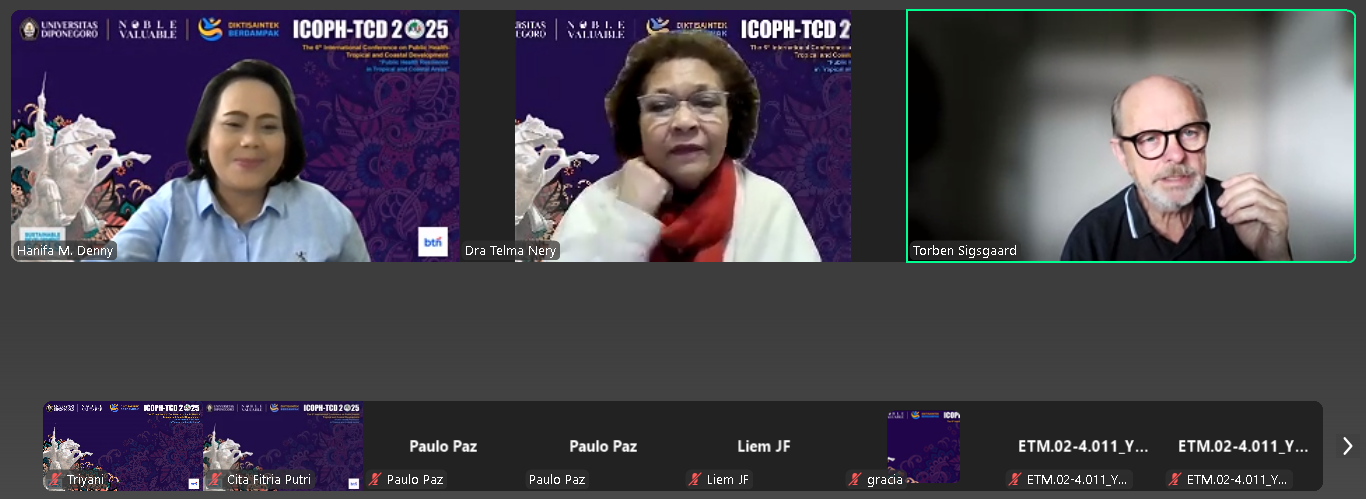The Special Session at the 6th International Conference on Public Health (ICOPH) hosted by the Faculty of Public Health, Universitas Diponegoro, brought together distinguished experts from around the world to discuss pressing issues in occupational health, with a particular focus on pesticide exposure, agricultural safety, and rural health systems. Chaired by Prof. Hanifa M. Denny, BSPH, MPH, PhD, the session was attended by 31 participants and served as a platform for exchanging research findings, policy initiatives, and practical approaches to improving health outcomes among agricultural workers.
The first presentation, delivered by Burak Kurt, Tufan Nayir, and Muhsin Akbaba, highlighted Training on Diagnosis and Treatment of Pesticide Poisoning for Healthcare Professionals and Introduction of Poison Centre Concept in Kazakhstan, Kyrgyzstan, and Tajikistan. The speakers emphasized the urgent need for capacity building among health workers in Central Asia to enhance early detection and treatment, while introducing poison centres as critical infrastructure for rural health.
Following this, Jen Fuk Liem and Sashikala Chandrasekar explored The Potential for Endocrine Disruption from Occupational Exposure to Agricultural Pesticides. Their findings shed light on the underrecognized hormonal impacts of chronic pesticide exposure, underscoring the importance of preventive strategies and stricter occupational safety standards. Torben Sigsgaard then presented his research on How Long-Term Organic Dust Exposure Impacts the Prevalence of Pulmonary Disease in Workers. Drawing on longitudinal data, he demonstrated clear associations between organic dust exposure and chronic respiratory conditions, reinforcing the need for workplace air quality control in agricultural industries.
The session continued with Claudio Colosio, Eugenio Ariano, Simona Savi, and Nicoletta Cornaggia introducing The Italian Plan for Health & Safety in Agriculture. This national initiative integrates regulatory frameworks, occupational health surveillance, and farmer education programs to reduce occupational hazards in Italy’s agricultural sector. Prof. Hanifa herself, alongside Burak Kurt, presented The Scientific Committee on Rural Health – Commission on Occupational Health: A Brief Insight. Their talk provided an overview of global collaborative efforts under the International Commission on Occupational Health to address the complex interplay between rural livelihoods and occupational safety.
Closing the session, Telma de Cassia dos Santos Nery and Paulo Junior Paz de Lima shared their study on Profile of Notifications of Poisoning and Suicide Attempts by Pesticides in Brazil between 2010 and 2024. Their data revealed alarming patterns in both unintentional and intentional pesticide poisoning, calling for integrated mental health and occupational safety interventions.
The session then proceeded with an interactive discussion and Q&A session moderated by Prof. Hanifa, where participants actively exchanged views, offered insights, and posed thought-provoking questions. The discussion highlighted the interconnectedness of occupational hazards, public health policy, and community-based interventions. Collectively, the presentations underscored the urgent need for global cooperation, stronger surveillance systems, and culturally sensitive training programs to safeguard the health of agricultural workers worldwide.

